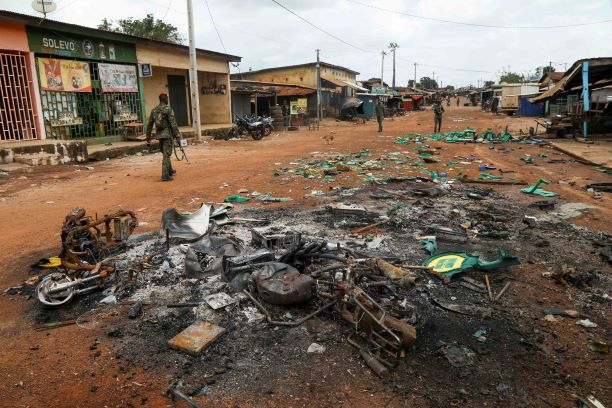New York,– Côte d’Ivoire’s authorities should urgently investigate the killing of more than 50 people in the political and intercommunal violence that accompanied the October 31, 2020 presidential elections and ensure that anyone responsible for unlawful killings is prosecuted, Human Rights Watch said on Wednesday, December 2, 2020.
Security forces failed to adequately protect civilians and in at least one case used excessive force to disperse opposition-led protests, shooting dead at least two demonstrators and beating a man unconscious.
President Alassane Ouattara was re-elected for a third term with a reported 94 percent of the vote in the controversial election, which the main opposition parties boycotted. The poll triggered confrontations between opposition and government supporters in the capital, Abidjan, and at least eight other towns, resulting in brutal street clashes fought with machetes, clubs, and hunting rifles.
“The killings of the past month pushed Côte d’Ivoire toward a deadly spiral of violence, a decade after the 2010-11 post-election conflict left over 3,000 dead,” said Jim Wormington, senior Africa researcher at Human Rights Watch. “Respecting the right to freedom of expression and assembly, including for opposition leaders and their supporters, will be a key ingredient to a peaceful resolution of the current crisis.”
Since the election, Ivorian authorities have arrested a dozen opposition party members, who rejected the results and said they had formed a National Transitional Council to organize new elections. The opposition members, including Pascal Affi N’Guessan, a former prime minister, were held incommunicado and questioned without access to lawyers for several days after their arrest. Three opposition members, including N’Guessan, remain in detention, while nine others have been released on conditional bail.
Human Rights Watch interviewed by telephone more than 36 people about the post-election violence, including 24 victims and witnesses from Abidjan, Oumé, Toumodi, Elibou, and M’Batto, as well as journalists, lawyers, opposition party members, and civil society representatives. Human Rights Watch also analyzed photographs and video footage to corroborate victim and witness accounts.
On November 20, Human Rights Watch sent a summary of findings and questions to Aimée Zebeyoux, Côte d’Ivoire’s secretary of state for human rights. Zebeyoux sent a letter in response on November 25.
Côte d’Ivoire’s National Human Rights Council said on November 10 that 55 people were killed and 282 injured between October 31 and November 10. The Ivorian government said on November 11 that 20 people were killed on election day and an additional 31 in the days that followed. Human Rights Watch documented 13 of these deaths, including 2 people killed during violence between government and opposition supporters on election day, 9 during clashes in the following days, and at least 2 who were killed by security forces.
On election day, victims and witnesses in Abidjan, Oumé, and Toumodi told Human Rights Watch, groups of opposition supporters seeking to prevent the election clashed with pro-government groups who wanted the vote to take place.
“There were dozens of them [opposition supporters] telling us, ‘There won’t be an election here, we don’t need foreigners,’” said a government supporter in Oumé, repeating an often-used characterization of government supporters as migrants from other parts of Côte d’Ivoire or elsewhere in West Africa. “We went to arm ourselves with clubs and machetes. Someone from their side slipped on a stone, and people just crowded round him and beat him to death. At least 10 people were injured on our side, including one person who fractured his skull.”
In Abidjan’s Yopougon Kouté neighborhood, an opposition stronghold, witnesses said pro-government youth arrived from elsewhere in the city to prevent opposition supporters from disrupting the vote. “I saw a group coming into the neighborhood in two Gbakas (minivans), blue taxis, and scooters,” said one witness. “They were armed with machetes, knives, and guns. I went out with what I could to defend my village. The neighborhood youth started throwing stones, and there were so many of us that they fled. One of the government supporters couldn’t escape in time, and he was beaten to death by our young people.”
Witnesses to the election violence, including both government and opposition supporters, said that the security forces did not do enough to prevent violence and protect civilians. “The attack lasted for hours and yet no police officer came,” said a man from Toumodi, who hid in his house and prayed while attackers burned down shops and homes in his neighborhood on November 1. A family of four burned to death in their home.
Zebeyoux, the human rights secretary of state, in a letter to Human Rights Watch said that the government’s efforts to secure the election and prevent communal and political violence had “allowed the vote to run smoothly and contained the vast majority of the unrest.” She said that no one had been killed or injured by shots fired by the security forces, and that investigations were underway to “identify and apprehend anyone (supporters of the government as well as the opposition)” who committed crimes.
On November 9, UN High Commissioner for Human Rights Michelle Bachelet expressed “serious concerns about the arrests of several opposition leaders” and urged “political leaders from all sides to work together to calm the tensions through dialogue – not heavy-handed security responses and arrests.” The African Union and the Economic Community of West African States (ECOWAS), a regional bloc, criticized the opposition parties for establishing the National Transitional Council but have also called for dialogue to resolve the crisis.
“Targeting opposition members through a flawed legal process will not ease the dangerous political and ethnic tensions running through Côte d’Ivoire,” Wormington said. “The Ivorian authorities should focus on investigating and prosecuting all those responsible for the killings in recent weeks, no matter their political affiliation, including members of the security forces who used excessive force against protesters.”

